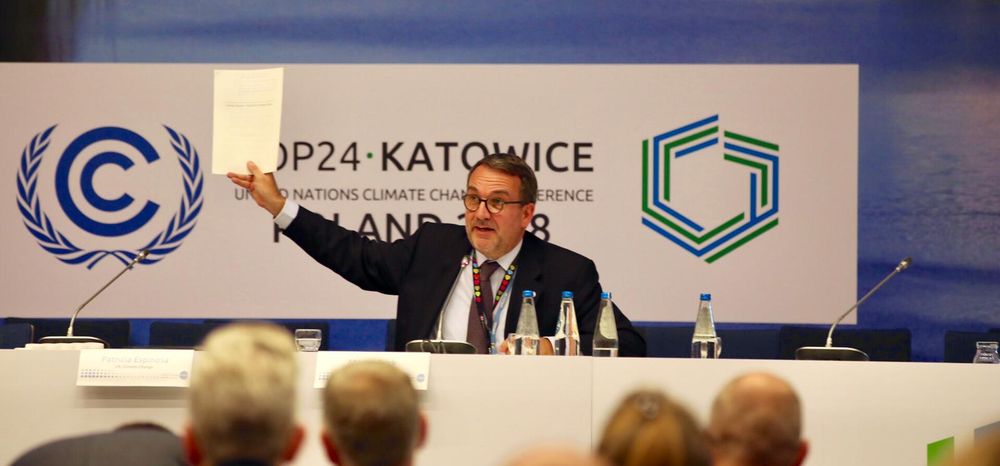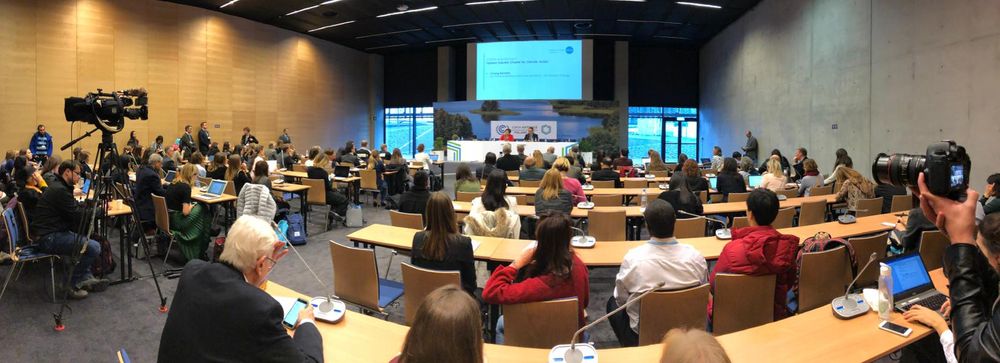December 10, 2018

The global fashion industry made a significant push toward addressing climate change today by launching the Fashion Industry Charter for Climate Action.
Under the auspices of UN Climate Change, leading fashion brands, retailers, supplier organizations, and others, including a major shipping company, have agreed to collectively address the climate impact of the fashion sector across its entire value chain.
 Photo Credits: Kaia Rose / Connect4Climate
Photo Credits: Kaia Rose / Connect4Climate43 leaders, including adidas, Burberry, Esprit, Guess, Gap Inc., Hugo Boss, H&M Group, Inditex, Kering Group, Levi Strauss & Co., Puma SE, PVH Corp., and Target; leading membership organizations, including Business for Social Responsibility, Sustainable Apparel Coalition, China National Textile and Apparel Council, Outdoor Industry Association, and Textile Exchange; global logistics company Maersk; and global NGO WWF International have committed to implementing or supporting the 16 principles and targets that underpin the Fashion Climate Charter.
The Charter, which is open for other companies and organizations to join, recognizes the crucial role that fashion plays on both sides of the climate equation: as a major contributor to greenhouse gas emissions, and as a sector with multiple opportunities to reduce emissions while contributing to sustainable development.
 Photo Credits: Kaia Rose / Connect4Climate
Photo Credits: Kaia Rose / Connect4ClimateAligned with the goals of the Paris Agreement, the Charter envisions the industry achieving net zero emissions by 2050, and defines a wide variety of issues that signatories will need to address in order to make that happen. These include decarbonizing the production phase, selecting climate-friendly and sustainable materials, implementing low-carbon transport, improving consumer dialogue and awareness, working with policymakers and the financing community to catalyze scalable solutions, and exploring circular business models. To make concrete progress on these commitments, six working groups have been established in which signatories will collaborate to lay out next steps.
The signatories are also taking immediate action, however. They have set an initial target to reduce their aggregate greenhouse gas emissions by 30 percent by 2030, and have defined concrete measures, such as phasing out coal-fired boilers and other sources of coal-fired heat and power generation in their own companies and direct suppliers by 2025.

“The fashion industry is always two steps ahead when it comes to defining world culture, so I am pleased to see it now also leading the way in terms of climate action. I congratulate the signatories of this important charter, which represents a unique commitment and collaboration from an array of fashion leaders. The Charter, like the renowned fashion runways of the world, sets an example that I hope others will follow.”

UN Climate Change Executive Secretary Patricia Espinosa
The Charter is industry-led, but open to a wider group of fashion stakeholders. It is supported by a range of relevant organizations and NGOs that will keep the industry honest in terms of ambition. Progress will be monitored and recorded by UN Climate Change. The Charter aims to drive climate action in the sector, including by complementing and supporting other fashion sector initiatives aimed at increasing climate action.

“We are aware that more than 90 percent of PUMA’s Carbon Footprint is being generated in shared supply chains. If we want to reduce carbon emissions in our supply chains, we need to work together with our industry peers. The Fashion Industry Charter for Climate Action provides a collective industry effort to support the goals of the Paris Agreement. We appreciate that UN Climate Change has set up a global platform and call upon our industry peers to join the initiative.”

Bjørn Gulden, CEO of PUMA

“This charter is about getting the fashion industry united in important climate work. Our industry has a global reach and only together can we create the change that is urgently needed. We are happy to be a signatory of this charter as part of our ambition to become climate positive in our value chain.”

Karl-Johan Persson, CEO H&M group
In early 2018, fashion leaders volunteered to shape a climate movement through discussions in working groups chaired by PUMA SE and H&M Group. The launch today, during the critical UN Climate Change Conference in Katowice, Poland (COP24), reflects genuine sectoral buy-in, and is a clarion call to the fashion industry globally. The time to act is now.
The founding signatories are: adidas, Aquitex, Arcteryx, Burberry Limited, Esprit, Guess, Gap Inc., H&M Group, Hakro Gmbh., Hugo Boss, Inditex, Kering Group, Lenzing AG, Levi Strauss & Co., Mammut Sports Group AG, Mantis World, Maersk, Otto Group, Pidigi S.P.A, PUMA SE, re:newcell, Schoeller Textiles AG, Peak Performance, PVH Corp., Salomon, Skunkfunk, SLN Textil, Stella McCartney, Sympatex Technologies, Target and Tropic Knits Group.
Supporting organizations include: Business for Social Responsibility (BSR), China National Textile and Apparel Council (CNTAC), China Textile Information Center (CTIC), Global Fashion Agenda (GFA), Global Organic Textile Standard (GOTS), International Finance Corporation (IFC), Outdoor Industry Association (OIA), Sustainable Apparel Coalition (SAC), Sustainable Fashion Academy (SFA), Textile Exchange, WWF International and ZDHC (Zero Discharge of Hazardous Chemicals Foundation).
By signing on to the Fashion Industry Charter for Climate Action, the CEOs and presidents of these organizations have confirmed their commitment to address climate change and their willingness to step up collaboration within and beyond the fashion sector towards a cleaner, low-carbon future. The fashion industry — which encompasses the textile, clothing, leather, and footwear sectors, from the production of raw materials to the manufacture of products to their distribution and consumption — is known for long supply chains, energy-intensive production, and high levels of waste. Now's the time to right the ship.

“Burberry is proud to be a signatory of the Fashion Industry Charter for Climate Action. While we have committed to becoming carbon neutral in our own operations, achieving a 30 percent reduction in greenhouse gas emissions across the entire global fashion industry by 2030 will require innovation and collaboration. By working together with other signatories of the Charter, we believe that we can achieve systemic change and build a more sustainable future.”

Marco Gobbetti, Chief Executive Officer, Burberry

“Climate change is undoubtedly one of, if not the biggest challenge of our lifetime. It is and will affect everyone on this planet and our future. This is why I am proud to be a signatory of the Fashion Industry Charter for Climate Action. I want to call on my peers in the business, from other brands to retailers and suppliers, to sign up to this charter now and take the necessary actions to address the reality of the issue of climate change in their business and value chains. Collectively we have a voice and the capacity to make a difference.”

Fashion designer Stella McCartney
Principles and actions outlined in the Fashion Industry Charter for Climate Action will be pursued and developed collectively through working groups convened by the UN Climate Change in early 2019. Any company or organization professionally engaged in the fashion sector, regardless of where they are in their environmental journey, is welcome to endorse the Charter and participate in this work.



